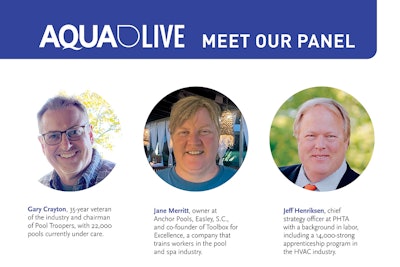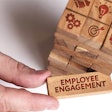

With good workers in short supply, the importance of all aspects of workforce management are magnified. In our particularly labor-intensive industry, the ability to hire, develop and retain quality pool and spa professionals is essential to profitability.
With that in mind, at the AQUA Live Leadership Retreat in December, we brought together three different expert perspectives on the labor problem for a roundtable discussion. Their insights can help you shape your own approach to maintaining a quality workforce.
AQUA: Let's start with company culture, which has gotten a lot of attention in our industry over the last few years.
Gary: Well, we need to create a culture in our businesses so that people will want to work there, and to avoid the churn. When you churn through new employees, your costs go up, and your customer service goes down.
AQ: How do you go about creating a good company culture?
Jane: A lot of it is just getting buy-in from everybody, so everybody has a voice at the company. We were very fractured as a company for a lot of years when I was growing up and that was one of the things I wanted to fix, to help us become a team.
One problem was that everybody thought the other guy's job was easier, and so we did a lot of cross-training.
For instance, construction guys thought that retail people just sat in the air conditioning all day long, so I made each construction guy come and shadow me on a Saturday in the summertime. And without fail, every one of them said, "Please don't ever make me do that again."
So they got an appreciation for what happens in the retail store. Things like that give everybody a little bit more understanding so that we can all work together.
You have to build your culture. I almost lost a really good employee once because he didn't see that he could go any further, and that kind of changed my thinking. My message for new employees is: When I hire you, I'm hiring you to retire you. It's not for a year, it's not for two years. I mean this to be an ongoing thing for the rest of our adult lives. And, of course, it doesn't always work out, but that is the mindset I go into it with. And they need to know that's the way I feel about it.
Keeping your workforce is all about the culture. It's not so much about want ads and advertising and all that kind of stuff, it's creating that culture inside your own company so that people want to work there. So they tell their friends and their friends want to work there.
Jeff: I agree with Jane, it's that word of mouth and the connections in your community that can really lead to some of the most rewarding employees. Among the 14,000 apprentices in the program, I was a part of in the HVAC industry, 90% were word-of-mouth.
If you don't already have an in-house reward program for referrals from employees, that's obviously something that you should work on right away. You should be rewarding your employees that give you good employees, whether it's a monetary bonus or paid time off or something else. That can be your best source.
PHTA has established the pool professionals pipeline, which is a workforce development effort. There's a website with a job board we launched in May. We've had 26 million impressions so far, a hundred thousand visitors, and on the job board, 831 jobs posted by 200 companies. So it's really kicked off well.
And we have two new apprenticeship programs at PHTA — the pool maintenance and service technician apprenticeship programs.
AQ: How is that apprenticeship program different from just a person coming and joining a company?
Jeff: The apprenticeship program is 2,000 hours of on-the-job training (which is full-time work for a year) and then 182 hours of training online through PHTA courses. At the end, after the exams, you have CPO certification, CMS and CST certification.
It formalizes training, so the next person you hire six months from now, they get the same exact training. It establishes that consistency that you can talk to clients about.
It's not the only option you have, but it at least establishes a curriculum and a path for that first year. It has built-in pay raises. So wherever the company starts you, at six months you get a bump and then at 12 months you get a bump to whatever your full position pay is going to be as a service technician, et cetera. So that kind of lays out a path and increases retention. Everyone knows the path at least for the next year. Which is easier for both employers and employees.
AQ: Keeping workers is partly about offering them a future.Gary, how are you approaching that at Pool Troopers?
Gary: You have to show them a path forward. As a residential pool service company, historically, we have had very linear career paths. When you came in, you became a pool service technician then upon becoming good at that, you got an opportunity to either become a pool mechanic or a supervisor.
But now it doesn't have to be a linear path. You can go up to the Carolinas now and work in retail or construction. Or you can come to the corporate offices and work in the accounting team. And we have enough of those non-linear paths now that we can internally advertise that and say, "Here's an example of three people who've taken alternative paths. You're not stuck where you are."
If you take the time to train somebody and put all that knowledge in their head, you don't want them to leave in the next year. You want them to stay and help train the next generation of people. So you have to offer alternative paths for growth in the company.
I'm not so sure that salary is the only component that excites the newest generation of workers. They want to have that work-home balance. So to be competitive with other employers, we have to give them that work-life balance, because if they don't feel like they have that, they're going to go somewhere else and work 30 hours a week and do their side hustle.
AQ: How can we contend for workers with industries that are much larger and have more resources?
Jane: Well, money is one thing. You have to be competitive, that's a given. But small businesses can offer a lot that big businesses can't. Big companies can throw a huge salary at you, but they're going to give you a bunch of other things that you don't want along with it. So that's where you have to be better.
One of my guys is really big into fishing. He loves fishing tournaments, and so I make sure that he can be off to do that. That's a big thing for him. He came to us from a bigger industry, making more money, but now he's got more freedom, and he's got a say in the company.
You can't manage one-size-fits all anymore. I've learned that the hard way. (I like to learn everything the hard way.) You're really trying to make everybody happy at the same time, trying to deal with all the different personalities and stuff. If somebody asks me what I do, I always say: "I'm a daycare center."
AQ: How do you approach hiring?
Gary: As entrepreneurs, we should always be in a hiring mode, always be recruiting, always looking for talent because talent creates opportunity. If you have new talent that wasn't in your business yesterday, now maybe a new path opens up for you because of what they can do.
Jane: I say I'm always hiring, but I'm very picky about it. But I'm always looking. So you go out to eat and your waitress is awesome, that's a great person for retail. They can obviously handle multiple tables and that's what we have to do in a retail store, things like that. Same thing if it's Home Depot, Lowe's, whatever, somebody's a great worker, I hand out a card and say, "Hey, if you ever think about getting a new job, please come and see us, I'd be happy to have you."
I hired an entire landscaping crew I met on a jobsite because they were good, and they were being treated terribly by their company. They were using hand tools for everything, and we promised them battery-operated tools and they're like, "Yes."
Those are all just random things that happen, but you've got to be open to it and ready when your chance comes.
AQ: Do you look for people with pool experience?
Jane: I don't want anybody that has any experience. Taking that route has burned me. I'm looking for attitude. I can teach you how to build a pool or what chlorine is, but I can't teach attitude. I can't teach you how to be nice to somebody.
AQ: What about the generational differences we hear about all the time?
Gary: In our industry, it was always the older generation teaching the younger generation. But the people coming into the workforce now are the first generation in history to teach their parents and the older generation how to do things, because they understand technology so much better.
And therefore, they come to the workforce with an entirely different set of expectations. They expect to become leaders a lot quicker than we did when we were their age. We always had to put in our 20 years, and then we got to some sort of a leadership role. They want it a lot faster than that. And if we don't create a culture that recognizes that fact, we're missing out. The newest generation of workers are coming in more technologically savvy. They're better at using the new tools of the world than we ever will be.
This article first appeared in the February 2024 issue of AQUA Magazine — the top resource for retailers, builders and service pros in the pool and spa industry. Subscriptions to the print magazine are free to all industry professionals. Click here to subscribe.






































